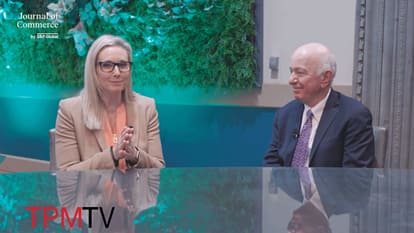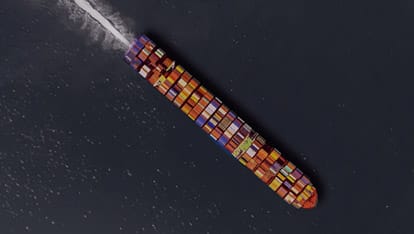- Program
- Speakers
- Who's Attending
- TPM Community
- Partners
- Media

TPM TV
Episodes of exclusive TPM content featuring interviews of key stakeholders and attendees.
WATCH NOW - About

About TPM
The must-attend conference for the trans-Pacific and global container shipping and logistics community
LEARN ABOUT TPM - FAQ's
- Get Updates
- Register
The biggest challenges facing the cold chain sector: a Q&A with Thomas Eskesen
January 10, 2024
Thomas Eskesen, the former Maersk global head of refrigerated shipping, founder of Eskesen Advisory, and chairman of TPM Cold Chain, shares his insight on some of the biggest challenges in the reefer container sector in this interview recorded on Jan. 4.
What is the impact of the Suez Canal diversions on the reefer market?
On the subject of the Suez Canal, this will have massive implications for the global cold chain industry. And much more than just meets the eye. Directly it’s not a major reefer corridor in terms of what goes through the Suez, it’s mainly protein to and from Europe and Asia, but you also have connecting points towards Africa and the Middle East, and we seek cargo now being stuck on either side of the canal, so for example if you are a fruit shipper from Egypt or Morocco and you have customers in China, then you can’t get your product through and a lot of these are time sensitive cargoes with a defined shelf life, so you will see pretty big implications on delays and the unpredictability of arrivals. At the same time you have cargo coming the other way through the canal from say India, fresh grapes going to the European market, and they also have limited shelf life so it’s becoming more and more disruptive for the fresh industry. We see shortages of products in the Middle East so far example if you are a customer and you are used to buying bananas in the supermarket in Saudi, or Dubai, some of those bananas will come from the Philippines that is fine, but the goods that then come through the Suez Canal from Ecuador or Costa Rica, that is not making it into the market, and that means we see commodity prices more than doubling because of the shortages.
If we try to predict the bigger picture, then I am getting worried now about flow, a lot of empty containers (typically) are passing through the Suez Canal that are being positioned from say China towards Brazil via Europe or it could be newbuilding containers form China needs to get to South Africa for the citrus season, those kind of disruptions are not visible to the eye here and now but they will hit down stream, so the cascading effect could be pretty significant. Every week this goes on the worse it will get. Then you have another effect which is pricing. We have seen the spot price on dry goods go up from China and to and from key markets. We week that the bottom of the reefer rates have been hit and the rates come up again. Those customers have not logged in their pricing even if it is from say Argentina to Europe, they might be in for a surprise because of the scarcity of the container, now they can’t move them around as freely as they could before, so our best advice to customer right now is to be a little bit paranoid and try to understand with the service providers not just the tactical side of what is happening on the vessels that are affected but downstream what does it mean for flow and so on. It’s a pretty massive event actually, probably the event the shipping lines were fearing, of course for crew safety but of course we can also see the stock market reaction which has been very positive, with Maersk shares up over 25% since this has happened. So bottlenecks are good for shipping lines, it ties up capacity of ships and equipment but for mankind hopefully this is over in a month or so, but it has already done enough damage to hit Q2 already, so we should all be concerned.
What are the other big challenges in the reefer sector?
The number one challenge by far is El Nino and weather, no matter where we look we have weather challenges. The El Nino effect is impacting the seafood catch off of the West Coast of Latin America, it’s impacting banana production on either side of the Panama Canal. We think the market has moved in 2023. There were shortages of fruit because of lack of profitability, the farmers were not making money in 2023, now we think it has moved to be a sellers market if they have the product. If they have not had weather implication to their harvest, they are actually in a very good spot in terms of selling to retail. So we should see pretty healthy profits again on the fruit grower side, but also watch out for shortages of fish and other things. We don’t see any demand problems in terms of consumer behavior in the Northern Hemisphere, which is still pretty good. It might only be the Chinese consumer which is showing a little bit of restraint but otherwise we see that demand is still good. So it’s the weather that is by far the biggest challenge for us in 2024. And that means retailers need to be very careful in terms of how tough they are on their suppliers. Rather they should be sure they lock in supplies versus try to beat up suppliers for lower pricing.
Tell us what is happening on the decarbonization front in reefers?
On the question of decarbonization in reefers, a couple of things are happening which makes me somewhat optimistic. Number one is the new regulation in Europe where the ETS fee is ensuring that now decarbonization is hitting the agenda and it’s becoming a talking point. It is frustrating of course for shippers that each carrier has their own methodology for computing the fee, but that is the nature of antitrust. But the second thing that has happen in recent months is that at the COP 28 in Dubai we saw the startup cold chain coalition that will start working end to end as a new ecosystem trying to increase temperatures from -18c to -15c and it seems like a subtle adjustment but the implication is about a 6-8% emissions savings, so that is massive. And we can see the buy-in for being part of that coalition is overwhelming. So this could pave the way for an whole other set of other things that we can attack such as food waste and other temperature regimes that requires and end-to-end view. So for example it’s not enough that a meat producer is in agreement to change the temperature point, you also need the shipping lines, and the cold storage providers and the truckers and the retailers to adjust the temperature throughout the cold chain. So this is still early days but it shows that the businesses are beginning to take this seriously. This is not driven by politics, it’s not driven by the UN or governments, it’s actually driven by businesses, because it’s good business for them and it’s common sense for them to work together as a coalition. I am much more optimistic than I would have been a year ago. We have moved away from the greenwashing to much more substantive work and collaboration, so it’s very encouraging.
Why attend TPM Cold Chain?
It’s the first real attempt globally to create a conference on the back of the bigger TPM conference. So we think we have the unique opportunity and value proposition that you get to listen to big industry players from the shipping industry, railroads, ports etc., and then following that we deep diver with the sector leaders from the cold chain whether it’s Lineage, Americold, the bigge shipping lines like Maersk, COSCO, Hapag Lloyd. There has been very strong buy in from the shipper and BCO community. We have set up 8 unique debates and we could have probably done 10-12 based on the interest, so very positive signs for the success of TPM Cold Chain 2024.
Join us in Long Beach on March 3-6, 2024, for the premier global ocean container supply chain conference. The new TPM Cold Chain track within TPM24 will offer unrivaled opportunities to ensure you are fully prepared for 2024 and beyond.
About the Journal of Commerce
The Journal of Commerce is produced by a team of specialized, subject-matter expert journalists providing original daily news analysis of international logistics for corporate logistics teams and other participants in global supply chains. We are accountable to paying subscribers who demand that our news and analysis be accurate, fair, independent, and informative. Part of S&P Global, the editorial team leverages extensive data assets and relationships built over many years throughout trade and transportation to deliver trusted, executive-level insights relied upon by senior logistics executives. The Journal of Commerce group builds on its expertise and source relationships to develop industry-leading conferences including TPM, Breakbulk, and Inland Distribution.
